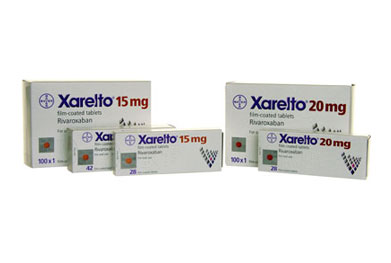Source: American Heart Association Nov 14, 2018 7 years, 1 month, 1 day, 20 hours, 30 minutes ago
Low-dose rivaroxaban (Xarelto) added to antiplatelet therapy was associated with reduced risk of thromboembolic events in heart failure patients, researchers reported here.
In post hoc analysis of the COMMANDER HF trial, rivaroxaban (2.5 mg twice daily) led to a lower composite of thromboembolic events (13.1% vs 15.5%, HR 0.83, 95% CI 0.72-0.96) compared with placebo, reported Barry Greenberg, MD, of the University of California San Diego, and colleagues at the American Heart Association (AHA) annual meeting.
The composite endpoint consisted of MI, ischemic stroke, sudden or unwitnessed death, and pulmonary embolism or symptomatic deep venous thrombosis.
Main COMMANDER HF results were reported at the 2018 European Society of
Cardiology meeting in Munich. In the study, low-dose rivaroxaban failed to lower the rate of a composite of all-cause death, MI, or stroke.
Greenberg pointed out that for the high-risk heart failure (HF) population enrolled in the trial, the primary composite events were "driven by events not influenced by rivaroxaban 2.5 mg twice daily." Also, an effect of the agent on thromboembolic events may have been "masked by the preponderance of events related to worsening heart failure."
The current study "tested the hypothesis that, compared with placebo, rivaroxaban 2.5 mg twice daily added to background antiplatelet therapy, would reduce rates of death and CV events in patients with recent worsening of chronic HF, reduced EF [ejection fraction], CAD [coronary artery disease], and sinus rhythm," Greenberg stated.
The researchers evaluated 5,022 patients (22.9% female; 82.2% white) with a mean age of 66.4 years.
The authors reported a significantly lower rate of ischemic stroke (1.6% vs 2.5%, HR 0.64, 95% CI 0.43-0.95) and a nonsignificantly lower rate of MI (2.1% vs 2.5%, HR 0.83, 95% CI 0.63-1.08).
Greenberg acknowledged study limitations, including the fact that patients had reduced EF, and it was not established how rivaroxaban affects thromboembolic events in patients with HF with preserved EF, Greenberg noted.
While the results "support the possibility that low-dose rivaroxaban may reduce the risk of thromboembolic events in HF patients," Greenberg said, "...confirmation of these results by a prospective trial is required in order to establish a role for low-dose rivaroxaban in treating HF patients."
